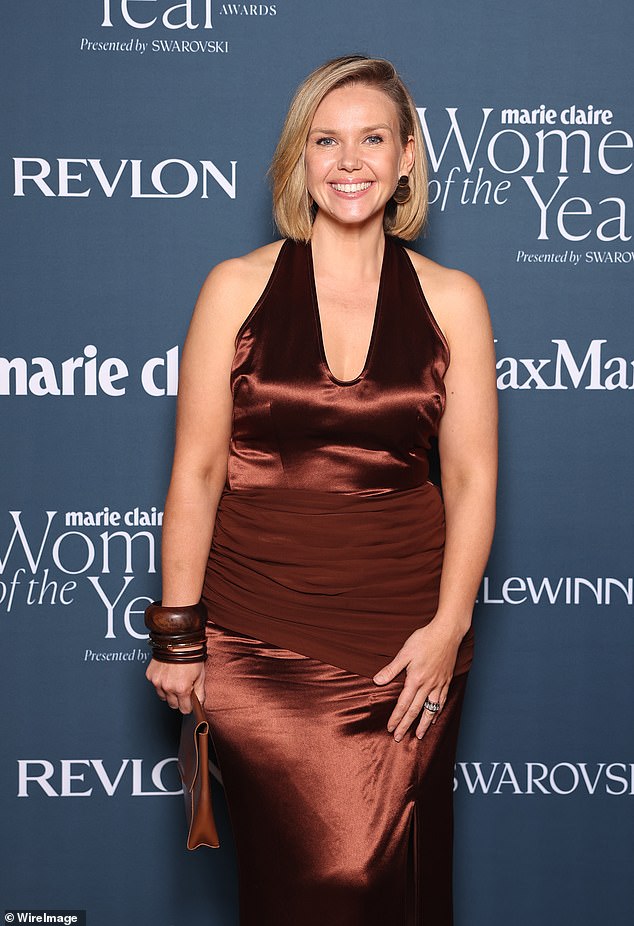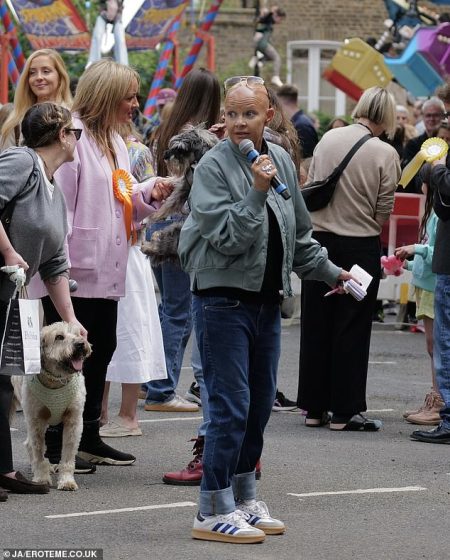Summarize this content to 2000 words in 6 paragraphs Edwina Bartholomew has given an emotional update on her ‘life-changing’ cancer battle and spoke about her career plans.The Sunrise star, 41, revealed that she had been diagnosed with chronic myeloid leukaemia (CML) – a type of blood and bone marrow cancer – live on air in September. Edwina was first diagnosed in July and has since cut down on her work with the popular Channel Seven breakfast program to focus on her health.She has mostly remained out of the spotlight in recent months, but has now given an update on her health and revealed whether she will be returning to her fulltime TV work.Speaking to Stellar’s Something To Talk About podcast, Edwina said she still finds it a ‘shock’ to say she has leukaemia after months of processing the difficult diagnosis.She said she feels extremely lucky because they caught the cancer early as she reassured her fans that she is doing ‘really well’ and has had ‘fantastic’ test results so far. Edwina Bartholomew (pictured) has given an emotional update on her ‘life-changing’ cancer battle and spoke about her career plans The TV presenter explained that she takes her medication twice a day, at 3am and 8pm, and will have to continue to do so for at least the next few years.’My white blood cell count is almost back to normal, and there’s another indicator that’s looking really good as well,’ she shared. ‘Perspective and mindset have been a big part of the process from the get-go. People can live with this their entire life and because I caught it so early, I could be rid of it in a few years.’Edwina said the diagnosis prompted her to start taking care of her health and she has now cut out gluten, coffee, alcohol and sugar from her diet and has taken up more exercise. She emotionally admitted that while she often forgets she has cancer, it sometimes ‘smacks’ her in the face as she detailed a recent scare when she had pneumonia.’Most days I forget I have cancer and then some days it really smacks you in the face. I recently had pneumonia – and I don’t normally get sick… says she, who’s got cancer,’ Edwina shared.’I was wiped out for days. I think until that point, I’d been really hyper-focused on life continuing as normal and this wasn’t going to change me. ‘And then I realised, well, it has changed me innately, both physically and mentally, that was a real adjustment. I had to allow myself to be really sad about it for a bit.’ The Sunrise star, 41, revealed that she had been diagnosed with chronic myeloid leukaemia (CML) – a type of blood and bone marrow cancer – live on air in SeptemberEdwina said she is now focusing her attention on being present with her husband Neil Varcoe and their two young children – daughter Molly, four, and son Tom, two.She admitted her diagnosis has made her rethink her mindset on life and realise that she cannot continue waking up at 3am for her early morning gig hosting on Sunrise.’The 24/7 go, go, go approach I had to life for the past 40 years had to shift. This has definitely been a huge takeaway for me that life can’t continue like that,’ she went on.’I’ve had to say to work, ”I can’t now go back to work five days a week at 3am in the morning, it’s not something that I can do” – to their credit, Channel Seven has been phenomenal about that.’Edwina’s remarks about cutting down on her TV work come after it was rumoured that she is shifting from her long-held role at the Seven breakfast show.She is said to be planning to move to the network’s Sydney newsroom when veteran newsreader Ann Sanders, 64, announces her retirement, according to news.com.au.The proposed move is said to make things easier for Edwina, who would no longer have to wake up at 3am to get ready for work amid her health struggles.In September, Edwina revealed live on-air that she had been diagnosed with cancer in a tearful admission. Amid rumours that she is taking on a new role in Seven’s newsroom, Edwina told how she can no longer do the 3am starts on Sunrise and is focusing on her family – her husband Neil Varcoe and their kids Molly, four, and Tom, two’I have been diagnosed with cancer. That’s a shock and hard to say,’ she sadly told viewers.’It is a really good kind. It is called chronic myeloid leukaemia. It can be treated with a daily tablet. If I can take care of myself, I will be completely fine.’The veteran TV star then began to break down in tears before telling the audience: ‘I thought I could keep it together.’Edwina went on to reveal her co-star Natalie Barr was to thank for her getting diagnosed as quickly as she had been.Nat had her own cancer scare in June, after a routine skin check uncovered skin cancer on her nose, which persuaded Edwina to undergo a full health check at her own doctors.’I had a mammogram after I had a few lumps. That came back all clear. I even had an eye check,’ she explained.’That’s fine. But my doctor sent me to get routine blood tests at the same time, one of those tests came back with levels out of whack.’I feel lucky and I wanted to share this with you for a couple of reasons. Firstly, because everyone at home and here has been here for all the wonderful times, for the engagements, the weddings and the babies, for all of us.’ Edwina said the diagnosis prompted her to start taking care of her health and she has now cut out gluten, coffee, alcohol and sugar from her diet and has taken up more exercise’Many of you have been in similar situations or worse and come out the other side stronger… and more resilient. That’s exactly what I plan to do,’ she added.Edwina said the other reason she wished to share her news was to encourage others to prioritise their health as well.’Please, particularly for mums who always take care of everyone else, please take care of yourself. And just check in with your doctor,’ she said.The Seven star found out about her shock diagnosis in July and kept it secret from the public, telling only a few friends at work.According to Mayo Clinic, CML is an uncommon type of cancer in the bone marrow and is very slow to progress.Advances in treatment have improved the prognosis of people with CML and most people diagnosed with it can achieve remission and live for many years.What is Chronic Myeloid Leukaemia?According to the Leukaemia Foundation, Chronic Myeloid Leukaemia (CML) is a rare type of cancer that affects the blood and bone marrow.CML causes the bone marrow to produce too many white blood cells called granulocytes.These cells, which are also referred to as ‘leukaemic blasts’, crowd the bone marrow and interfere with the production of normal blood cells.The cells also ‘spill out’ of the bone marrow and circulate through the body via the bloodstream.Approximately 330 Australians are diagnosed with CML each year, accounting for just 0.03 per cent of all cancers diagnosed.CML can occur at any age, but is much more common in people over the age of 40 who account for almost 70 per cent of all diagnoses.It also occurs more frequently in men than women. CML typically develops gradually in its early stages, progressing slowly across three phases: chronic, accelerated, and blast, over weeks or months.More than 90 per cent of people are diagnosed in the early chronic phase where the blood counts remain relatively stable and the proportion of blast cells in the blood and bone marrow is typically five per cent or less. Most people display few, if any, troubling symptoms of their disease in the chronic phase.CML progresses from a relatively stable disease to a more rapidly progressing one in just five per cent of cases. In this accelerated phase, a proportion of blast cells in the bone marrow and blood may increase.If left untreated, accelerated phase CML can develop into blast phase CML, however, there is generally less than a 5 per cent risk that it will transform into a rapidly progressing disease that resembles acute leukaemia.The risk is lowered to just one percent for patients who have a positive response to drug therapy.About two-thirds of blast phase CML cases transform into a disease resembling Acute Myeloid Leukaemia, with the remainder transforming into one resembling Acute Lymphoblastic Leukaemia. While treatment is largely dependent on the phase of the disease, age and health, most patients will be treated for CML with drugs called tyrosine kinase inhibitors (TKIs).These drugs block the activity of an enzyme called bcr-abl which prevents the growth and proliferation of these leukaemic cells.















